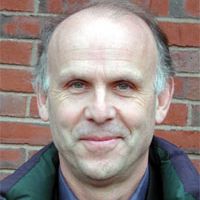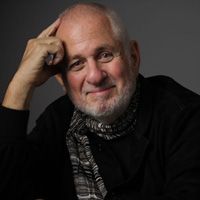The Edge Question 2018 - 14 [1]
 [2]
[2]|
|
|
|
Jason Wilkes [16]
[16]
Graduate student in Psychology, UC Santa Barbara; Author, Burn Math Class
Why are the errors that our best machine-learning algorithms make so different from the errors we humans make?
Evan Williams [17]
[17]
CEO, Medium
What will be obvious to us in a generation that we have an inkling of today?
Alexander Wissner-Gross [18]
[18]
Scientist; Inventor; Entrepreneur; Investor
Can general-purpose computers be constructed out of pure gravity?
Milford H. Wolpoff [19]
[19]
Professor of Anthropology, University of Michigan; Adjunct Associate Research Scientist, Museum of Anthropology
Can the pace of human evolution stop accelerating?
Richard Wrangham [20]
[20]
Ruth Moore Professor of Biological Anthropology, Curator of Primate Behavioral Biology at Harvard University; Author, Catching Fire: How Cooking Made Us Human
In which century or millennium can all humanity be expected to speak the same primary language?
Elizabeth Wrigley-Field [21]
[21]
Assistant Professor, Department of Sociology, University of Minnesota-Twin Cities; Faculty Member, Minnesota Population Center
How do our microbes contribute to that particular combination of continuity and change that makes us human?
Richard Saul Wurman [22]
[22]
Founder, TED Conference; EG Conference; TEDMED Conferences; Architect, Cartographer; Author, Information Architects
Clarify the differences between understanding, knowledge and wisdom that could be communicated to a literate twelve-year-old and recommunicated to their parents.
Victoria Wyatt [23]
[23]
Associate Professor of History in Art, University of Victoria
How do contemporary developments in technology affect human cultural diversity?
Itai Yanai [24]
[24]
Director, Institute for Computational Medicine; Professor, Biochemistry and Molecular Pharmacology, New York University School of Medicine; Co-author (with Martin Lercher), The Society of Genes
How can we rebel against our genes if we are biological creatures without free will?
Dustin Yellin [25]
[25]
Artist; Founder, Pioneer Works
Will the frontiers of consciousness be technological or linguistic?
Eliezer S. Yudkowsky [26]
[26]
Research Fellow; Co-founder, Machine Intelligence Research Institute
What is the fastest way to reliably align a powerful AGI around the safe performance of some limited task that is potent enough to save the world from unaligned AGI?
Dan Zahavi [27]
[27]
Professor of Philosophy; Director, Center for Subjectivity Research, University of Copenhagen; Author, Self and Other: Exploring Subjectivity, Empathy, and Shame
What is the world without the mind?
Anton Zeilinger [28]
[28]
Physicist, University of Vienna; Scientific Director, Institute of Quantum Optics and Quantum Information; President, Austrian Academy of Sciences; Author, Dance of the Photons: From Einstein to Quantum Teleportation
Will the individual quantum event forever remain random?
Carl Zimmer [29]
[29]
Journalist: Author, A Planet of Viruses; Science Ink: Tattoos of the Science Obsessed
How does the past give rise to the future?
|
|
|
|
